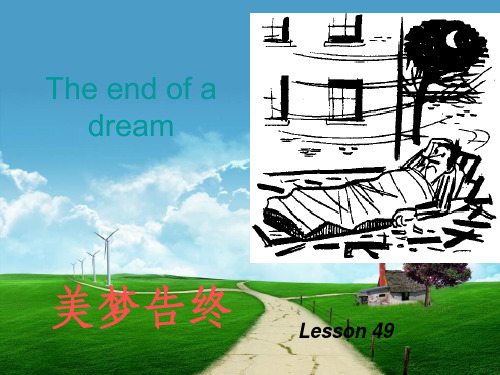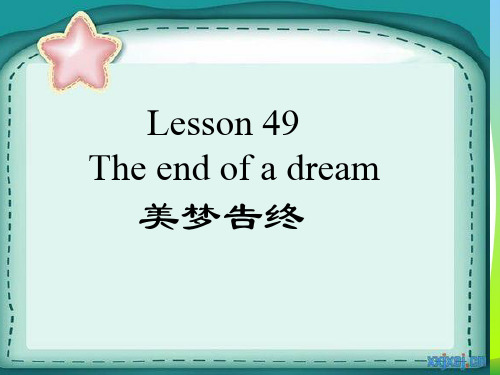新概念英语49课课件
新概念英语NCE3_lesson49(共18页)课件

• Not only was the meal • well below the usule to walk steadily. • She bumped into the furniture • and kept mumbling • about the guests.
• that I never even got a chance • to learn their names. • Though my aunt pursued • what was, in those days, • an enlightened policy, • in that she never allowed • her domestic staff • to work more than eight hours a
• She was sentimentally • attached to this house, • for even though • it was far too big • for her needs, • she persisted in living there • long after • her husband's death.
Lesson 49 The ideal servant
• What was Bessie's ‘little weakness’?
• It is a good thing • my aunt Harriet died years ago. • If she were alive today • she would not be able to • air her views on • her favourite topic of
conversation:
新概念英语第二册教学课件(第49课)

② also有时可省略,或与but分开用,或用too、as well代替(位于句末)。 Sports not only keep a man healthy,but they (also)give him team spirit. 运动不仅可以强身健体,而且还能培养人的团队精 神。 We not only lost all our money,but we (also) came close to losing all our lives 我们不仅损失了全部的金钱,而且差点把命搭上。
Either his parents or his uncle and aunt are going to Hong Kong.
不是他的父母就是他的伯父伯母要去香港。
What he lacks is not intelligence but perseverance.[ˌpɜːrsəˈvɪrəns] 他所缺乏的不是聪明才智而是毅力。
3.not only..but also...连接并列分句时,若not only位 于句首,它所在的分句要用倒装结构。 Not only can Jane play the piano wonderfully,but she can also dance very well. 简不仅钢琴弹得漂亮,而且舞跳得也很好。
②连接两个名词组成一个密不可分的整体。
Angus is a worker and writer.安格斯是一个工人, 也是一个作家。
Bread and butter is a nutritious food.
黄油面包是一种有营养的食物。
③口语中,and 常用于try、wait、go、come、 hury up、stop等之后表示目的,相当于不定式符号 to。
新概念英语第二册lesson49完整ppt课件

美梦告终
Lesson 49
NEW WORDS AND EXPRESSIONS
1.Tire N&V • [v] (使)疲倦,疲劳 • Sth tires sb …使某人疲倦 • Eg: The long class tires me. • Working all day tires him.
by the wind. • A new broom sweeps clean.
精选ppt
• 8.★courtyard n. 院子 • court n. 院子,庭院;法庭 • yard n. 院子 • backyard n. 后院 • frontyard n. 前院
精选ppt
• 9.★smash v. 碰碎, 摔碎 • ① vt.&vi. 打碎,摔碎,(使)碎裂 • The cup smashed on the floor. • smash sth. into pieces 把……摔成碎片 • tear sth. into pieces 把……撕成碎片 • The bed was smashed to pieces. • The letter was torn to piece.
• 7.★sweep (swept[swept],swept) n. 扫刮
• ① vt. 扫,打扫 • 她每天早上都打扫地板/房间
• She sweeps the floor/the room every morning.
• ② vt. (风)吹;刮 席卷
• A huge wave swept over the deck。 • 一股巨浪从甲板上卷了过去 • sweep sth. away 把……刮走 • The newspaper has been swept away
新概念英语Lesson49-50(共15页)课件

后面。
•9、阅读使人充实,会谈使人敏捷,写作与笔记使人精确……史鉴使人明智;诗歌使人巧慧2021/9/252021/9/25Saturday, September 25, 2021 •10、每一本书是一级小阶梯,我每爬上一级,就更脱离畜生而上升到人类,更接近美好生活的观念,更热爱书籍。2021/9/252021/9/252021/9/259/25/2021 8:07:06 PM •11、书是人类进步的阶梯,终生的伴侣,最诚挚的朋友。2021/9/252021/9/252021/9/25Sep-2125-Sep-21 •12、阅读一本不适合自己阅读的书,比不阅读还要坏。我们必须会这样一种本领,选择最有价值、最适合自己所需要的读物。2021/9/252021/9/252021/9/25Saturday, September 25, 2021 13、He who seize the right moment, is the right man.谁把握机遇,谁就心想事成。2021/9/252021/9/252021/9/252021/9/259/25/2021 •14、谁要是自己还没有发展培养和教育好,他就不能发展培养和教育别人。2021年9月25日星期六2021/9/252021/9/252021/9/25 •15、一个爱书的人,他必定不致缺少一个忠实的朋友,一个良好的老师,一个可爱的伴侣,一个优婉的安慰者。2021年9月2021/9/252021/9/252021/9/259/25/2021 •16、提出一个问题往往比解决一个更重要。因为解决问题也许仅是一个数学上或实验上的技能而已,而提出新的问题,却需要有创造性的想像力,而且标志着科学的真正进步。 2021/9/252021/9/25September 25, 2021 •17、看文字须大段精彩看,耸起精神,竖起筋骨,不要困,如有刀剑在后一般。就一段中须要透;击其首则尾应,击其尾则首应,方始是。不可按册子便在,掩了册子便忘。 2021/9/252021/9/252021/9/252021/9/25
新概念英语第二册Lesson 49 (共90张PPT)

Grammar
• I didn’t expect anyone to be in the house. • I walked straight in.
Grammar
• My girlfriend is a doctor. • She knows what medicine you should take.
• Who saved up for years? • A young man in Teheran did.
Comprehension questions
• What did he save up to buy? • A real bed.
Comprehension questions
• Why did he want one? • He was tired of sleeping on the floor.
•↓ • Having completed the book, he had a holiday.
Grammar
• 特殊情况1:完成时
• have done • has done • had done
having done
Grammar
• She had taken off her shoes. • She walked into the house.
Comprehension questions
• What happened on the third night? • A storm blew up.
Comprehension questions
• What swept the bed off the roof? • A gust of wind did.
Grammar 主谓
新概念英语Lesson49-50(共15页)课件

others
3.truth: n ----true(反义词是fause) adj. to tell the truth :实话实说 eg: To tell the truth, I don’t like
Key words
u.n.
beef
meat--肉类统称
lamb mutton
butcher
steak mince
Vegetables &fruits
n.
tomato
potato cabbage lettuce
pea bean pear
grape peach
others
1.husband: n. --wife 2.tell v (told) ~ sb about sth
句型训练
1.He likes _____,but he doesn’t like _____. 2.She likes _____,but she doesn’t like
____. 3.Mary likes ____,but Mary doesn’t like
___. Does she like ___? Yes,she does. No,she doesn’t. 4.He likes potatoes,but he doesn’t want
略了like lamb) 4.What about some steak? (这里用了some,是希望得到对方的肯定回答) What about….?=How about….?(…怎么样?)
新概念英语第二册第49课课件.ppt

for the 越大(程度在加深),(指暴风雨 )
出现并加剧;刮起
speak up 大声点
5、A gust of wind swept the bed off the roof and sent it crashing into the courtyard below.
save up 攒钱,储蓄 I want to get married in one or two years, so I’m trying to save (some money) up.
2、For the first time in his life, he became the proud owner of a bed which had springs and a mattress.
off = down/away from
below 直接放在被修饰词之后作定语
crashing into the courtyard below是现在分词短语,作 宾语补足语.
gust表示“一阵强风,一阵狂风”,既可单独使用, 也可用a gust of wind形式: A gust (of wind) blew my hat off.
She set off even though the wind was blowing in gusts. 虽然当时阵阵狂风吹着,她还是出发了。
Lesson 49
The end of a dream
美梦告终
★tired adj. 厌烦的 be/get tired of sth./doing sth. 讨厌做某事
★spring n. 弹簧 spring n. 春天;泉水 fountain n. 人工喷泉
新概念英语第二册第49课课件

在去北京长途旅行后,他精疲力竭 He was tired out after his long trip to Beijing.
2.real adj. 真正的 (强调东西不是假的)
true adj 真挚, 真诚, 符合标准 (强调符合某个标准)
7.Although the bed was smashed to pieces, the man was miraculously unhurt.
although 尽管,放句首,语义强;though 虽然,意义 差不多,以从句出现 to pieces 粉碎地,成碎片地
The cup was了碎片。
glare at vs stare at
glanced at, stare at, glare at 1.He _g_la_n__c_e_d___over the letter he had just received. 2.I told my son to stop __s_ta_r_in__g___at that fat woman; it wasn't nice . 3.The woman_g_l_a_re_d___ at the man after he shouted rudely at her .
5.A gust of wind swept the bed off the roof and sent it crashing into the courtyard below.
gust表示“一阵狂风”,既可单独使用,也可用a gust of wind形 式
off = down/away from crashing into the courtyard below是现在分词短语,作宾语补足 语。 below 直接放在被修饰词之后作定语
- 1、下载文档前请自行甄别文档内容的完整性,平台不提供额外的编辑、内容补充、找答案等附加服务。
- 2、"仅部分预览"的文档,不可在线预览部分如存在完整性等问题,可反馈申请退款(可完整预览的文档不适用该条件!)。
- 3、如文档侵犯您的权益,请联系客服反馈,我们会尽快为您处理(人工客服工作时间:9:00-18:30)。
Lesson49 At the butcher’s. 在肉店
一、课文中重要单词
meat: n. (食用)肉(不可数名词)
Do you eat meat every day? 你每天都吃肉吗?
Yes, I do. / No, I don’t.
beef: n. 牛肉(不可数名词)
There isn’t any beef on the plate. 盘子中没有什么牛肉。
lamb: n. 羔羊肉,小羊肉(不可数名词)
He doesn’t like lamb, either. 他也不喜欢羔羊肉。
husband: n. 丈夫
wife: n.妻子
steak: n. 牛排
How do you like your steak?你想要什么样的牛排?steak rare:半生的牛排;steak medium:半熟的牛排;
steak well-done(全熟的牛排)
mince: n. 肉馅(不可数名词)
She wants some mince. 她想要一些肉馅。
chicken: n. 鸡,鸡肉
There are some chickens behind the house.
在房子后面有一些小鸡。
What do you want? 你想要点什么?
I want some chicken. 我想要一些鸡肉。
tell: v. 告诉:掌握与tell相关的几个词的用法:
speak + 语言:
speak Chinese 说汉语/ speak English 说英语/ speak French 说法语
talk: 谈话,交谈
I want to talk to you. 我想和你谈一谈。
Say: 说(强调说的内容)
He always says that he is a good man.
他总是说他是一个好男人。
truth: n. 实情,真相; tell the truth 说实话,告诉真相;find out the truth 找到真相;
either: adv. 也(用于否定句)
too用于肯定句和疑问句中。
I like that girl, too. 我也喜欢那个女孩。
Is he a policeman, too? 他也是一名警察吗?
My brother doesn’t like coffee, either. 我的兄弟也不喜欢咖啡。
二、课文中重要知识点
1. Do you want beef or lamb? 您想要牛肉还是羔羊肉?
在本句中需要引起注意的知识点是选择疑问句的用法:
选择疑问句是指提出两个或两个以上可能的答案供对方选择的句式。
英语中含有or的问句称为选择疑问句。
(1)选择疑问句结构很简单,就是先把一般疑问句结构写出,
然后在其后加上“or + 选择部分”即可。
例:
Which would you prefer, tea or coffee?
茶和咖啡,你喜欢哪一种?(两项选择)
Would you like tea, coffee, or milk?
你喜欢茶、咖啡、还是牛奶?(三项选择)
How shall we go, by bus or by train?
我们怎么走?乘公共汽车还是坐火车?(两项选择)
(2)选择疑问句的回答不同于一般疑问句,不能用yes/no来回答,而必须选择选项进行回答。
例:
Which would you like, tea or coffee?
茶和咖啡,你喜欢哪一种?
----Coffee. 茶。
Have you ever been to Beijing or Shanghai?
你曾经去过北京或上海吗?
-----(I‘ve been to) Shanghai.
我去过上海。
2. What about some steak?
来点牛排怎么样?
在本句中我们复习一下英语中关于“提建议”的几种常见的表达方式:
(1)What/how about+名词/动名词:
、、、怎么样?
What/How about opening the window? 打开窗子怎么样?
(2)why not+动词原形=why don’t you+动词原形:
你为什么不、、、、?
Why not go to school by bike?
为什么不骑自行车去上学呢?另一种表达方式:
Why don’t you go to school by bike?
为什么不骑自行车去上学呢?
why not+动词原形与why don’t you+动词原形这两个句型表达的意思是一样的,在日常的运用中可以互换。
(3)Would you like to do sth?
你愿意、、、、?
Would you like to lend me your pen a minute?
你愿意把你的钢笔借给我用一会吗?
3. I don’t like chicken either. 我也不喜欢鸡肉。
(1)too: adv.也,还;常用于肯定句,有时也用于疑问句,但不能用于否定句。
常见于句末,而且too前常有逗号;如果不在句末,too前后都应当有逗号.例:
I like lamb, too. 我也喜欢小羊肉。
Can I come, too? 我也来,行吗?
I, too, have been to Shanghai. 我也到过上海。
(2)either: adv.也,而且; 一般用于否定句,位于句末,前面通常有逗号,有时也不用。
例:
He doesn't like the house, and I don't like it, either. 他不喜欢这所房子,我也不喜欢。
If you do not go, I shall not go, either.
如果你不去,那么我也不去。
